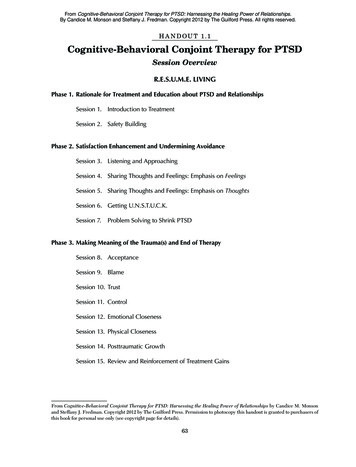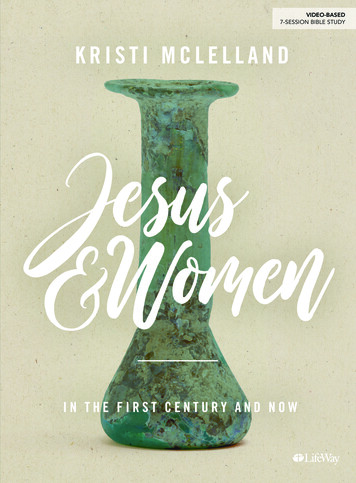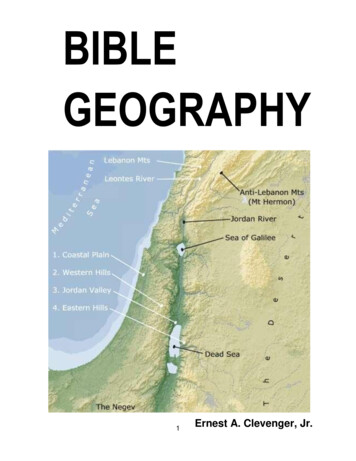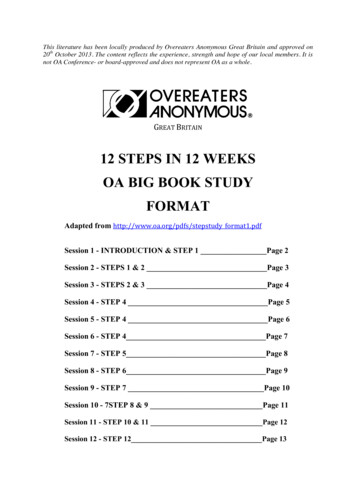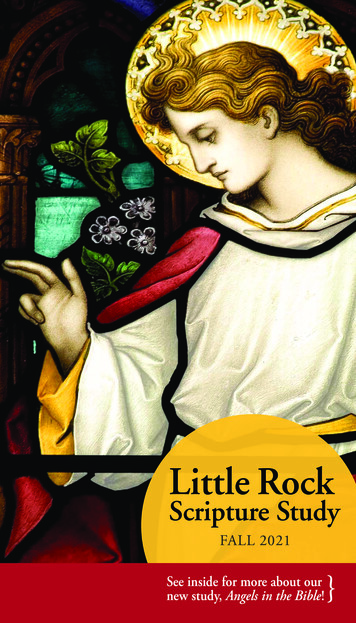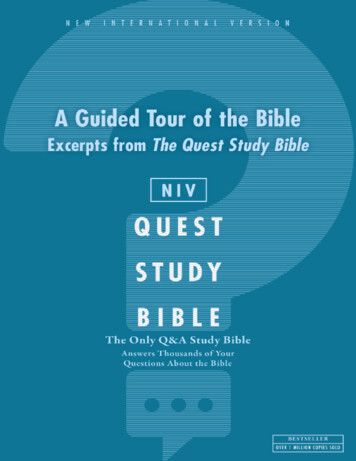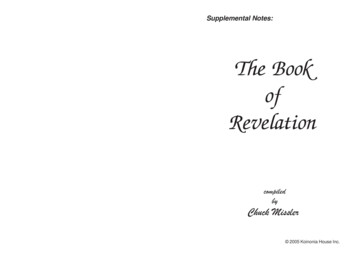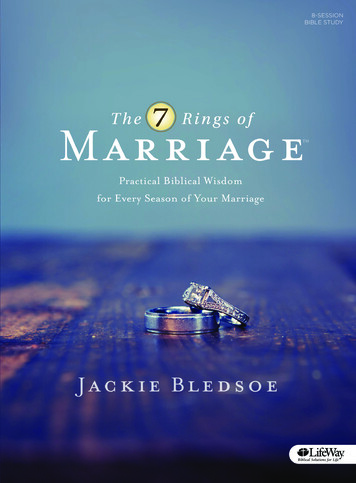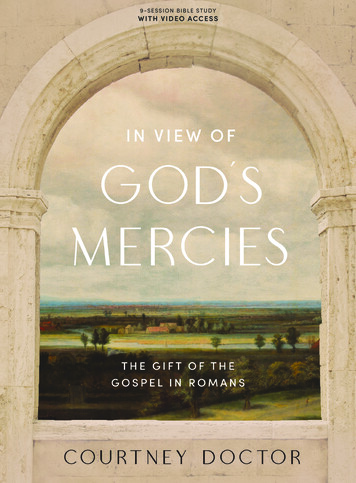
Transcription
9- S E S S I O N B I B L E ST U DYW I T H V I D EO AC C E S S
Lifeway Press Nashville, Tennessee
Published by Lifeway Press 2022 Courtney DoctorNo part of this book may be reproduced or transmitted in any form or by any means, electronicor mechanical, including photocopying and recording, or by any information storage or retrievalsystem, except as may be expressly permitted in writing by the publisher. Requests for permissionshould be addressed in writing to Lifeway Press ; One Lifeway Plaza; Nashville, TN 37234.ISBN: 978-1-0877-4748-4Item: 005833030Dewey decimal classification: 227.1Subject heading: BIBLE. N.T. ROMANS / SALVATION / CHRISTIAN LIFEUnless otherwise indicated, all Scripture quotations are from the ESV Bible (The Holy Bible, English Standard Version ), copyright 2001by Crossway, a publishing ministry of Good News Publishers. Usedby permission. All rights reserved. Scripture quotations marked CSBhave been taken from the Christian Standard Bible , Copyright 2017 by Holman Bible Publishers. Used by permission. ChristianStandard Bible and CSB are federally registered trademarks ofHolman Bible Publishers. Scripture quotations marked (NIV) aretaken from the Holy Bible, New International Version , NIV .Copyright 1973, 1978, 1984, 2011 by Biblica, Inc. Used by permission ofZondervan. All rights reserved worldwide. www.zondervan.com.The “NIV” and “New International Version” are trademarks registered in the United States Patent and Trademark Office by Biblica,Inc. Scripture quotations marked NKJV are taken from the NewKing James Version . Copyright 1982 by Thomas Nelson. Used bypermission. All rights reserved. Scripture quotations marked RSVare from the Revised Standard Version of the Bible, copyright 1946, 1952, and 1971 National Council of the Churches of Christ inthe United States of America. Used by permission. All rights reservedworldwide.To order additional copies of this resource, write Lifeway ResourcesCustomer Service; One Lifeway Plaza; Nashville, TN 37234; Fax orderto 615.251.5933; call toll-free 800.458.2772; email orderentry@lifeway.com; or order online at lifeway.com.Printed in the United States.Lifeway ResourcesOne Lifeway PlazaNashville, TN 37234EDITORIAL TEAM,LIFEWAY WOMENBIBLE STUDIESBecky LoydDirector,Lifeway WomenTina BoeschManagerChelsea WaackProduction LeaderMike WakefieldContent EditorErin FranklinProduction EditorChelsea WaackGraphic DesignerLauren ErvinCover Design
Table of ContentsAbout the Author4A Word from Courtney5Session One: Introduction8Session Two: Mercy Calls Us10Session Three: Mercy Convicts Us34Session Four: Mercy Saves Us60Session Five: Mercy Frees Us86Session Six: Mercy Holds Us112Session Seven: Mercy Humbles Us138Session Eight: Mercy Transforms Us162Session Nine: Mercy Sends Us188Leader Guide216Endnotes2223
About the AuthorCourtney Doctor is an author, Bible teacher,frequent conference and retreat speaker, andperiodic blogger. She received an MDiv fromCovenant Theological Seminary in 2013 and is theauthor of From Garden to Glory: A Bible Study onthe Bible’s Story and Steadfast: A Devotional BibleStudy on the Book of James and the co-author ofthe resource Remember Your Joy: A Bible Study ofSalvation Stories in the Old Testament. She currentlyserves as the Coordinator of Women’s Initiatives forThe Gospel Coalition. Her greatest desire in all ofthis is to be able to faithfully study, apply, and teachthe Word of God and help others do the same. Findher online at courtneydoctor.org.DedicationTo Craig: you, like Paul, are a man completelycaptured and captivated by the mercies and goodnessof God. Your passion for the beautiful gospel of gracethat God has lavished on us is a joy to behold. Thankyou for all the ways you love God and love me. I ameternally grateful for you.4IN VIEW OF GOD’S MERCIES
A Word from CourtneyWelcome! I am so excited to study Romans with you. Many people might shy away fromthis book of the Bible thinking it’s just an academic look at doctrine and theology. Butwhile Romans contains both doctrine and theology—and certainly helps us understandthe glories of God and His marvelous salvation—Paul was not, first and foremost, writinga systematic theology book. He was writing a personal letter to a church—a group of newChristians in the capital city of the Roman empire—to instruct, encourage, correct, andcompel them to continue in the gospel.Romans is a passionate letter written by a man completely captured by the beauty andmajesty of God and His glorious salvation. Paul wanted his readers (then and now)to know how amazing and all-encompassing the gospel actually is—that it’s powerful,planned, eternal, and free. Paul also wanted his readers to rejoice and rest in the gloriousramifications of this salvation for everyone who is in Christ: peace, life, freedom, adoption,love, hope, and all the other mercies we’ll see.Paul’s hope was to exalt Jesus and point his readers to Him. He wanted us to understandthe depths of the gospel of grace and to know the hope of a transformed life. Because,after God saves us, He invites us to join Him on His twofold mission—working in us,sanctifying and conforming us to the image of Jesus, and working through us, sending usout to others with the good news of salvation in Christ.Oh, friend, I need to be reminded of each of these every day. I need to grow in myunderstanding of the gospel of grace, to rejoice and rest in the way the gospel informs themoments of my days, and to join God in His work of conforming me to Jesus as He sendsme with the message of this glorious gospel to the ends of the earth. Join me in askingGod to do that in each of us through this study!How to Use This StudyWe are going to approach our study of Romans with an inductive approach—a methodthat will be helpful no matter what book of the Bible you are studying. On most daysof study, we will first observe the text by asking, What does it say? Then we will attemptto interpret the text by asking, What does it mean? In the last step we will seek to applythe text by asking, What do I do? This order helps us slow down and really examine thepassage. Let me further explain.5
What Does It Say/Observation: As we observe the text, we want to notice things likerepeated words and specific details and to note any illustrations. We’ll ask the basic who, what,when, where, and how questions. If you don’t know the meaning of a word, look that word upand write down what you learn. Also, write down any questions you have as you read.What Does It Mean/Interpretation: When we move to interpretation, we’ll askquestions about meaning. We’ll consider the intent of Paul, the author, and see the passagethrough the lens of the original audience—the believers in Rome who heard it first. Atthis point, we are not asking what this text means to me; we’re asking what it would havemeant to them.What Do I Do/Application: The last step is to ask how this passage is meant to transformme. We want to consider what God has done and then ask how He wants us to respond inreturn. Our responses might include: repent, obey, believe, pursue holiness, wait, trust, bestill, speak up, give, go, or worship. We’ll let the interpretation of the text inform the application of the text.Each session is broken into five increments of daily study per week. Plan on approximatelytwenty minutes of study each day (or an hour and a half each week). Each week willbegin with prayer—a time for you to ask God to meet you as you study His living andactive Word. I’ve provided a prayer to start your study each session, but I encourage youto journal your own prayers throughout the week. Share with God your gratitude, joy,repentance, sorrow, questions, and commitments.I recommend you have a print Bible in front of you, rather than using an app on yourphone or computer. The Bible passages found in this Bible study book are mostly from theEnglish Standard Version, but feel free to use whatever translation you prefer.Here are some other features of the study:Digging DeeperAt the end of each day of study, you will have the opportunity to dig a little deeper into thetext. I’ve listed three other Scripture passages for you to look up and see how they relateto the Romans passage we’re studying for that day. We want to be students of the wholecounsel of God’s Word, and this section will help us do that!6IN VIEW OF GOD’S MERCIES
DefinitionsYou might come across words and phrases you are unfamiliar with or want more clarity about theirmeaning. To provide this insight, I’ve included pull-out definitions throughout each session anda glossary of terms as an addendum on lifeway.com/mercies. Note: these definitions are based on mypersonal study and experience. We will use THIS STYLE to mark these terms throughout the study.A Closer LookWe will just begin to scratch the surface of Romans in nine sessions. We could spend yearstogether in this glorious book. So, our thirty-thousand foot overview will limit the amount anddepth of what we can cover. However, there are some passages, phrases, or concepts I want tocall special attention to for a deeper dive together. These designated callout sections are markedthroughout the study as “A Closer Look.”Memory WorkA memory verse(s) is provided each session. Spend a few minutes each day memorizing it. Thediscipline of hiding God’s Word in your heart will bear much fruit in your life and the lives ofthose around you. And a little memory verse “quiz” is provided at lifeway.com/mercies!Video TeachingYou have access to video teaching that provides additional content to help you better understandand apply what you just studied in the previous session. You’ll find detailed information for howto access the video teaching sessions that accompany this study on the card inserted in the backof your Bible study book.Feel free to take notes on these video teaching sessions in the space provided on the GroupSession pages. If you’re doing this study with a group, you can use the questions and promptsprovided on the Group Session pages to help you review the previous five days of study anddiscuss the video teaching together.I’m truly looking forward to studying Romans with you. May God powerfully meet you in the studyof His Word. My hope is that you will behold the mercies of God in new ways, be transformedmore into the image of Jesus, and rejoice more in the gift of the gospel that is ours in Christ.Much love,CourtneyYou’ll find detailed information for how to access thevideo teaching sessions that accompany this study on thecard inserted in the back of your Bible study book. 7
SESSION ONEIntroduction#I nV i e w o f G o d s M e r c i e s
VIDEO & GROUP GUIDESession One:MERCY SPEAKSWATCH Session One video teaching.1. Believe that God has called you to this study.2. Do the personal study. Read Think Pray Apply3. Show up to your small group discussion.4. Expect God to work.DISCUSSION QUESTIONS1Courtney said, “We do not study God’s Word merely to be informed;we study God’s Word to be transformed.” Why is that important toknow as you study God’s Word?2Share a recent experience of how God used His Word to bring aboutchange in your life.3When it comes to God’s Word, which do you find the most joy in:reading it, meditating on it, praying through it, or applying it? Whichdo you struggle with the most? Why?4What are some hindrances, distractions, or obstacles you might facein being able to complete the personal study each week? If you’rea Bible study veteran, what tips would you offer in how to stay thecourse in our study?5Do you expect God to work in you through this study? What is onething you are asking Him to do?To access the video teaching sessions, use theinstructions in the back of your Bible study book.9
SESSION TWOMercy Calls UsROMANS 1:1-17
IntroductionHere we go! As we embark on this journey together, remember that studying God’s Wordis both an extremely practical and a wonderfully supernatural activity. As you show up tothis study in very ordinary ways—maybe still wearing your pajamas or sitting at a deskeating lunch or hoping the kids sleep for just thirty more minutes—God Himself is atwork. His Word is living and active; it’s acting on you as you study. Whether you havefollowed Jesus for a long time or are just trying to figure out who He is, the Holy Spirit ismoving, opening your eyes and heart, enabling you to understand and apply the Word.And, as we’ll see later in Romans, if you are in Christ, your mind is being renewed and youare being conformed more into the image of Christ. So pray, ask for insight and wisdom,do your homework, and know that God is at work in you as you study His Word.In this first session of study, we’re going to spend some time grounding ourselves inthe historical context of the letter—who wrote it, to whom it was written, and why.Understanding context is an important step in any study. We can’t know what God’s Wordsays to us until we know what God was first saying to the original readers (we’ll talk moreabout this on Day Two). This first session will be a little bit different than the othersbecause for the first few days, we won’t be asking, What does it say? What doesit mean? and What do I do? Instead, we’ll spend our time getting to know PaulMERCYand the church in Rome.God’s compassion,As we work our way through Paul’s opening words, seeking to understand whythey’re important, we’ll end the session looking at his grand thesis statementin Romans 1:16-17, your memory verses for the week. My hope is that we’llsee anew the power and MERCY found in the gospel of Jesus Christ.MEMORY VERSEpatience, andloving-kindnessthat causes Him towithhold what wedeserve (wrath andjudgment) and bygrace give whatwe don’t deserve(salvation and life).For I am not ashamed of the gospel, because it is the power of Godfor salvation to everyone who believes, first to the Jew, and alsoto the Greek. For in it the righteousness of God is revealed fromfaith to faith, just as it is written: The righteous will live by faith.ROMANS 1:16-17, CSB11
Prayer for the WeekFather, Your Word is life itself. Thank You for notleaving us alone but for speaking to us throughit. Please give me a mind to understand, eyes tosee, ears to hear, and a heart that longs to obey.I praise You for the gift of Your Son and the lifethat is ours in Him. In His name I pray, Amen.12IN VIEW OF GOD’S MERCIES
DAY 1From Whom?READ ROMANS 1:1-17.In my house we have two different artists’ replicas of Caravaggio’s famous painting,Conversion on the Way to Damascus. I love this painting because it reminds me of boththe power and mercy of God. In it, Paul is lying flat on his back after having been knockedoff his horse by God Himself.We don’t know if Paul was actually riding a horse, but we do know he fell to the ground,blinded by a great light. This drastic encounter was, ultimately, God’s great kindness to Paul.Paul was radically changed from someone who hated and persecuted Christians intoa man willing to give his whole life to the spread of the gospel. God’s mercy, majesty, andgreat salvation completely captured Paul. Keep this in mind as we learn the backstory ofthe man who wrote the glorious letter we’re studying.Read Acts 7:54–8:3.Who stood by (giving approval) for stoning Stephen to death?What did Stephen pray for (v. 60)?We first encounter Saul (his Jewish name)—also called Paul (his Roman name)—at thestoning of Stephen. Prior to the events depicted in the painting, Paul stood by and approvedof the killing of Stephen, ravaged the early church, contributed to the first great persecutionof Christians, and literally dragged men and women into dark, damp, and dangerousprisons—all because he hated the name of Jesus and everyone who followed Jesus.Read Acts 9:1-19.Why was Paul going to Damascus?Session Two13
How did Jesus describe Paul’s actions?What did the Lord tell Ananias about Paul (vv. 15-16)?When Paul talked about the “power of God for salvation to everyone who believes”(Rom. 1:16, emphasis mine), he spoke from experience. I love Caravaggio’s painting somuch because it portrays the power of God, knocking Paul off his horse—maybe literally,definitely figuratively—to save him.How have you experienced God’s power of salvation?As you saw in Ananias’ reaction, many of the early Christians were skeptical of Paul’sconversion and slow to trust its legitimacy. If I had been there, I might have felt the sameway. Sometimes it’s hard to believe that certain people have been saved.Read Acts 9:26. What did Paul try to do, and what response did he receive?Are there specific people you think of as too far gone, too hopeless, forGod to save? Write down anyone who comes to mind.If the people on your list were saved, would you rejoice or bedisappointed? Explain.14IN VIEW OF GOD’S MERCIES
Are there any sins you consider too heinous for God to forgive? If so,take a minute to write them down.Read Hebrews 7:25. What is Jesus able to do?If there are people whom you think are too far gone to be saved,please take a moment and pray for them. And remember, nothing isimpossible with God!If there are sins (your own or the sins of others) that you think are tooheinous for God to forgive, please take a moment and ask Him toremind you that “he is able to save to the uttermost those who drawnear to God through him” (Heb. 7:25).Before we turn our attention to the text of Romans, let’s note the dates and locationssurrounding the writing of this letter.Observe the following on the map on the next page: AD 33: Jesus was crucified, raised from the dead, and ascended intoheaven near Jerusalem. AD 33–34: Paul oversaw Stephen’s death. AD 34: Paul met Jesus on the way from Jerusalem to Damascus.After Paul’s salvation encounter with Jesus, more than a decade passed before he beganthe first of his three missionary journeys around the Mediterranean Sea and RomanEmpire. Those three journeys occupied his time for the next fifteen years. From variouslocations on these journeys, he wrote the majority of his thirteen letters we find in theNew Testament. The letter to the Romans, even though it’s the first of Paul’s letters weencounter as we turn the pages of Scripture, was most likely the sixth letter he wrote. A D 57: Paul wrote Romans to the Christians in Rome from Corinth,a town just west of Athens, during his third missionary journey(AD 53–57).Session Two15
RomeThree TavernsForum of AppiusLPompeii I acACHAIA t. ND PONTUSBLACK cus3SY R h inPisidiaLystraDerbe TarsusCyprusSidonA1,2JerusalemPaul wrote Romans fromCorinth while on his thirdmissionary journey.CORINTH (AD 57)DEAD SEAJUDEACaesarea mumEphesusRhodesAlexandria4EGYPTMemphisPaul met Jesus on theway to Damascus.ROAD TO DAMASCUS (AD eCYRENAICAJERUSALEM (AD 33–34)Paul approved ofkilling hegiumPuteoli I T ATYRRHENIANSEAMessanaSic ily2Syrtis MajorSyracuseJERUSALEM (AD 33)MaltaS y t ri s M i nor1Jesus’ crucifixion,resurrection, andascensionIN VIEW OF GOD’S MERCIES16P
We are finally ready to open our Bibles to the book of Romans!Read Romans 1:1. List the three things Paul said about himself asa way of introduction.What do you think each description means?APOSTLENone of us are first-century APOSTLES, but in what waysmight each of these things be true of us also?The New Testamentuses the wordapostle to refer tothe twelve men andPaul who “havingseen the risen Christ,[were] a witnessof His resurrection,and commissionedby Him, preach[ed]the gospel to allthe nations.”1Paul, a zealous Jewish Pharisee, became a passionate follower of Jesus. Hislife shone with the joy of a man who knew he’d been forgiven, redeemed,and made new. As we read Acts and Paul’s other New Testament letters, welearn that Paul, in his effort to proclaim this gospel that saved him, enduredbeatings, stoning, hunger, exposure, imprisonment, and was shipwreckednumerous times (2 Cor. 11:23-28). But, because he knew the power of the gospel, he knewthose sufferings paled in comparison to the “surpassing worth of knowing Christ Jesus”(Phil. 3:8) and proclaiming Him to all the world. As you work on your memory verses today,may Paul’s gratitude and passion for the gospel be yours as well.DIGGING DEEPERCheck out these verses to help you better understand today’s passage:Acts 26:12-18 Galatians 1:1 2 Peter 1:21Session Two17
DAY 2To Whom?READ ROMANS 1:1-17.One of my seminary professors said something in class one day that really rattled me. Hesaid, “The Bible was written for you, but not to you.” As you read that statement, you mayreact like I did—with indignation and frustration. I thought, What do you mean it wasn’twritten to me? I’d learned that the Bible was like a love note from God written directly to me.Not only did I eventually come to agree with him, but his point proved tremendously helpfulin my ability to understand, interpret, and apply the Bible in my own life. He meant that thewords in the Bible, as we saw yesterday, were written by real people, to real people. If youwere to read a letter I had written (back when that was something I did), knowing to whomI had written the letter would prove to be tremendously helpful. A letter I wrote to my momwould read very differently than a letter I wrote for a job application.In the same way, if you read a letter I wrote to my husband when we were dating as ifI had written it to you, you would be confused at best and uncomfortable at worst. But ifyou knew when and to whom I had written the letter, you would most likely find joy inthe love expressed.The people who first received the Scripture are called the original audience. We have tofirst understand what God, through the human author, was saying to them before we canknow what God is saying to us. That was my professor’s point.Read Romans 1:7. How did Paul describe the people to whom hewas writing?Paul addressed his brothers and sisters in Rome with words that express our foundational identity in Christ. I like how Dr. Michael Kruger said it, “Our identity is built onthree actions that God takes toward us in chronological order: (1) He loves us; (2) Hecalls us to himself, and (3) He makes us holy.”2 (The word used for saints can also betranslated holy ones.)318IN VIEW OF GOD’S MERCIES
In what ways have you experienced each of these aspects? Loved by God Called by God Made (more and more) holy by GodHave you ever wondered how this church in Rome came to be? If Paul had never been toRome, how did the church there get started? How had anyone in Rome even heard about Jesusand the events of His life, death, and resurrection—events that happened thousands of milesaway in Jerusalem? There were no TVs, cell phones, Internet, planes, trains, or automobiles. Sohow was a church started? How did the good news about Jesus reach Rome so quickly?Read Acts 2:1-12,37-41.What day did this event take place?Where were members of the crowd from?What was the result of Peter’s preaching (v. 41)?Based on the events in Acts 2, describe how the church in Rome mighthave started.Most likely, the church in Rome began with some Jewish men and womenwho were in Jerusalem on the day of Pentecost. They heard the gospel,realized Jesus was the fulfillment of all the Old Testament promises, andbelieved. They then took the gospel back home to Rome. As they faithfullylived out and proclaimed this good news, GENTILES living in the areaheard and also believed. As the church grew, it comprised both Jewish andGentile Christians. As we make our way through the letter, let’s keep inmind that this was a multi-ethnic congregation.GENTILESIn Greek the wordliterally means “thenations.” It is usedto describe anyonewho is not Jewish.4Session Two19
What were Jesus’ last words as He ascended into heaven (Acts 1:8)?What were the three geographical categories Jesus mentioned?How was the church in Rome part of the fulfillment of Jesus’ words?Envision life during this time in Rome, the capital city of the entireRoman empire. Based on what you know of people (yourself or others)who live in large, influential cities, what characteristics might describethis group of believers?According to Romans 1:7, what two things did Paul want God to give tothe believers in Rome? Write down a definition for each of them.Before you work on your memory verses today, reflect on God’s plan to build His churchand the ways He has done so through the ages. The gospel cascades down through faithfulpeople, like those in Rome, who, by the mercy of God, heard the good news of JesusChrist, believed, and shared this good news with others. You and I stand downstreamfrom them, the grateful recipients of God’s plan and their faithfulness. And, if we’refaithful to proclaim the gospel, others will receive it from us. What a gift, what a privilege!DIGGING DEEPERCheck out these verses to help you better understand today’s passage:Psalm 102:18 Jeremiah 29:7 Revelation 7:9-1020IN VIEW OF GOD’S MERCIES
DAY 3Grace to YouREAD ROMANS 1:1-7.Thanks to Twitter , Instagram stories, and texting, we’re growing more and moreaccustomed to brief blurbs and snappy phrases. The short, pithy sentence captivates us.If we’re not careful, we can “like,” “heart,” or retweet based more on the entertainmentvalue of the sentence than on the validity of its contents. Conversely, the first seven versesof Romans are one long sentence! (I guess Paul’s middle school English teacher forgot toteach him about run-on sentences.) Because we’re not used to reading such a long stringof ideas, we will need to slow down and pay attention in order to understand what Paulwas saying.What Does It Say?We’ve already seen that Paul described himself as “set apart for the gospel” (v. 1). Hewanted to make sure his readers began to understand what the gospel is—one of the mainthemes in his letter to the Romans. As we study together, we will learn more and moreabout both what the gospel is and what the gospel accomplishes.When was the gospelpromised?Where was it promised?To whom does thegospel concern?What is the result of thegospel through Christ?Where is the gospelto go?Session Two21
The gospel is all about Jesus, who He is and what He has done. But Paul wanted his readersto understand that while the events central to the gospel—Jesus’ incarnation, death, andresurrection—were unique, the gospel is not new news. The Old Testament points to thecoming of Jesus, and the New Testament proclaims that all the Old Testament promises havebeen fulfilled in Jesus (Matt. 26:56; Luke 24:27; 2 Cor. 1:20). This means that you and I, fromwhere we stand in the story of redemption—after the resurrection and before Jesus comesagain—have the key to understanding the Old Testament. The key is Jesus!What Does It Mean?How would you summarize Paul’s description of the gospel in Romans 1:1-7?How would you describe the relationship between obedience andfaith? Why do you think he might have included this phrase “obedienceof faith” (or “obedience that comes from faith” in the NIV translation) inhis description of the gospel (v. 5)?The relationship between obedience and faith is an important one. Faith comes first. Wedon’t receive salvation through obedience, we receive it only through faith. God first givesus the faith we need to believe, and then He calls us to respond to this great gift by livinga life of joyful obedience. Obedience flows from faith.What Do I Do?God’s eyes have always been set on the whole world. He told Adam and Eve to “Befruitful and increase in number; fill the earth . . .” (Gen. 1:28, NIV). He told Abrahamthat he would bless him so “all the families of the earth [would] be blessed” throughhim (Gen. 12:3). Jesus told His disciples to “go and make disciples of all nations”(Matt. 28:19, NIV) and be His “witnesses . . . to the end of the earth” (Acts 1:8). The planof God has always been to make a people for Himself and for that one people to be fromevery tribe, tongue, and nation. Or as the disciple John wrote, “For God so loved the world,that he gave his only Son, that whoever believes in him should not perish but have eternallife” (John 3:16, emphasis mine).22IN VIEW OF GOD’S MERCIES
In line with the heart of God, Paul longed to see the gospel go to all the nations. Paulhoped the Roman Christians would help send him to Spain to preach the good news there(Rom. 15:22-24). One reason he was so “eager to preach the gospel” to the Christians inRome was because he wanted them to be eager to proclaim it with him to the ends of theearth (Rom. 1:15).In what ways do you participate in the spread of the gospel to the ends ofthe earth? Remember, this could mean sharing the gospel in your family,your neighborhood, your city, your country, or anywhere in the world.Let’s close by going back to that phrase “obedience of faith” in verse 5. One author said it“means bowing the knee in trusting submission to Jesus the Lord, both at the start and allthrough the Christian life.”5If you are a Christian, describe how you are currently “bowing the knee intrusting submission to Jesus?” If you are not yet a Christian, what might bekeeping you from “bowing the knee in trusting submission to Jesus”?Spend a few minutes writing down your understanding of the gospel,both what it is and what it does. (Don’t worry if this feels hard. Romansis going to teach us exactly what the gospel is, so just take your bestshot at it for now. We’ll come back and do this again at the end of thestudy to see how your understanding has changed.)If you are a follower of Jesus, you and I are to be ready at all times t
About the Author 4 A Word from Courtney 5 Session One: Introduction 8 Session Two: Mercy Calls Us 10 Session Three: Mercy Convicts Us 34 Session Four: Mercy Saves Us 60 Session Five: Mercy Frees Us 86 Session Six: Mercy Holds Us 112 Session Seven: Mercy Humbles Us 138 Session Eight: Mercy Transforms Us 162 Session Nine: Mercy Sends Us 188 Leader Guide 216 Endnotes 222 .
